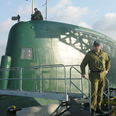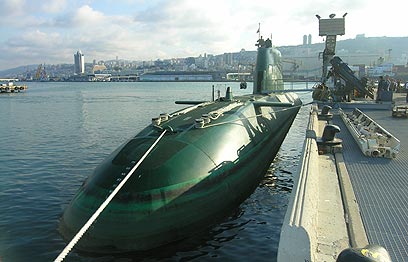
Colonel Yoni on board a Dolphin sub
צילום: דובר צה"ל
Sub fleet chief: We can hit targets overseas
In exclusive interview with Ynet, commander of army's most advanced, secret war machine fleet says submarines may be used in missions abroad; there's no room for women in unit, he states
Submarines may be used for hitting strategic targets outside Israel's territory, chief commander of the IDF's submarine fleet, Colonel Yoni, stated. "The submarine task force is preparing for any scenario the State of Israel has defined as plausible for the army," he added.
In an interview with Ynet, Colonel Yoni revealed some of the capabilities of the Israeli army's most hi-tech and secret war machine, and hinted to the possible role of subs in future military disputes.

Dolphin submarine. Nuclear capacities? (Photo: IDF's Spokesperson Unit)
According to him, "hitting strategic targets is not always a task the Air Force or the infantry can carry out… a submarine can perform the mission, and it can also be used only for collecting intelligence and securing the forces about to carry out such a mission."
Dozens of security operations, maybe even more, were made possible due to the IDF's sub fleet. However, these offensive and defensive missions will remain in the shadow for years to come, in order to enable the force to carry out similar actions in the future.
Nuclear capabilities?
While Colonel Yoni's statements are shrouded in mystery, publications in the foreign press have already hinted Israel's Dolphin submarines have the ability to carry and launch nuclear weapons, a capability that will be put to use should the country's nuclear ground bases are hit in a surprise attack.
The fleet commander naturally refused to comment on the subject, but said such publications abroad in themselves contribute to Israel's deterrence capacity.
"The fact that foreign reports refer to the submarines as a deterring factor says something. In matters having to do with existential threats we must remain vague," he said, adding the IDF has recently avoided holding joint drills with foreign armies, in a bid to maintain the secrecy of its weapons.
No girls allowed
Colonel Yoni, who is personally involved in selecting each and every soldier in his unit, speaks of the people under his command with admiration and appreciation. Nevertheless, when it comes to the service of women on submarines, he is not a bearer of news.
"The submarine was not built to accommodate both men and women. We are unable to allocate a special zone on the vessel for women dormitories. Why should we venture into something that has failed in a large part of the fleets in the world, where there is even more lenience on these issues?" he asked.
"Is it worth breaking the fabric created between combatants on the submarine? They are under a lot of pressure as it is," he concluded.










